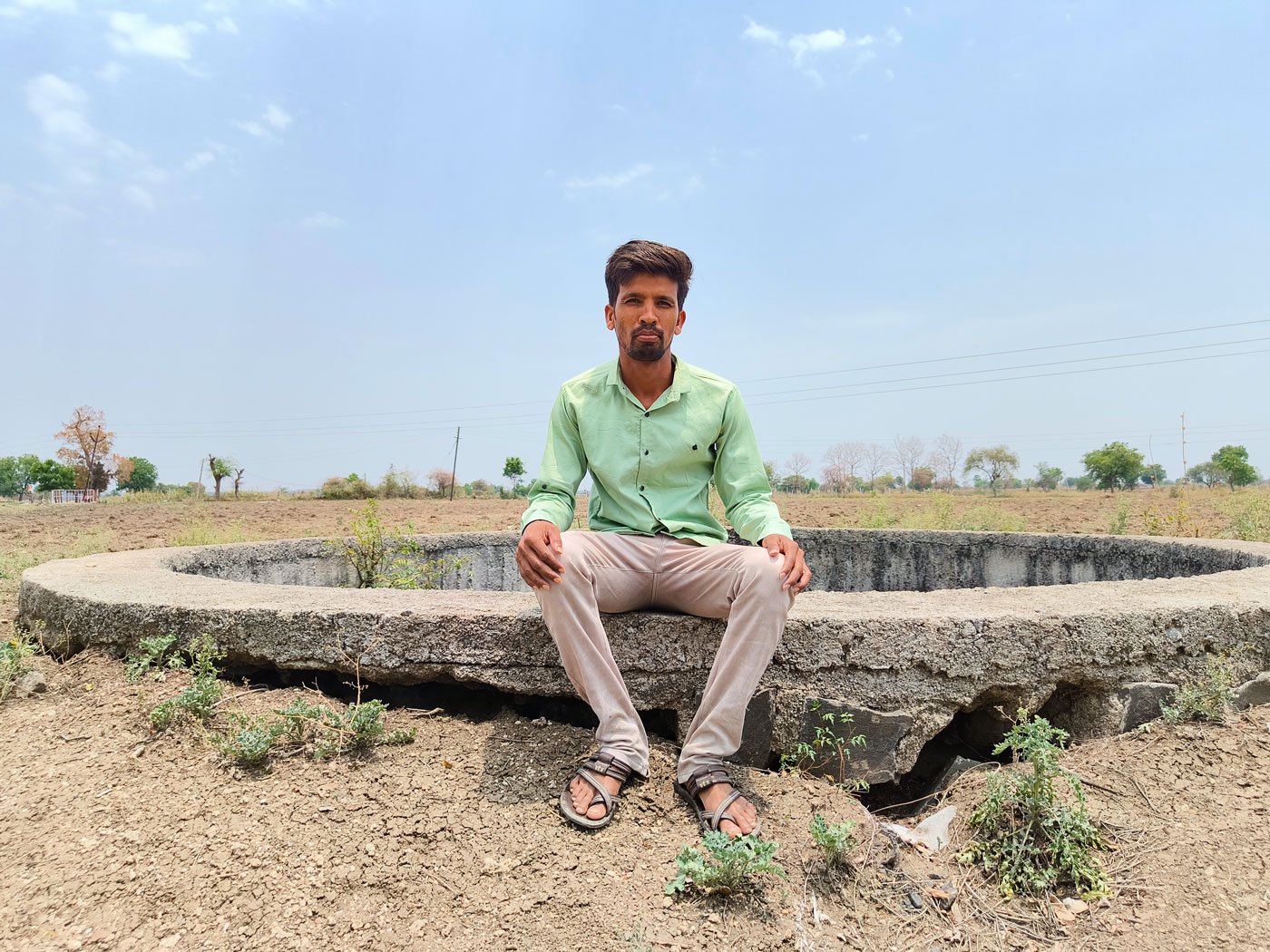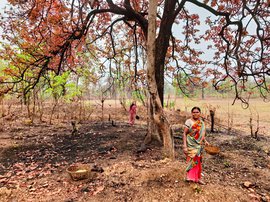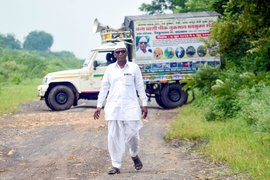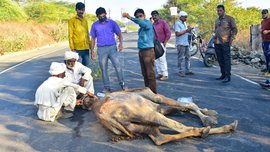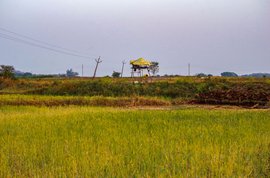Hemant Kawale insists on adding one more adjective before his name.
“I am educated, unemployed, and…unmarried,” quips the 30-year-old about his single status, poking fun at himself and his fraternity of young farmers.
“ Su-shikshit. Berojgar. Avivahit .” He spells each word with an emphasis, and his friends in their mid-30s around him at his small paan stall break into a nervous laughter that hides their anger and embarrassment over their forced bachelorhood. As if the joke’s also on them.
“That’s our main issue,” says Kawale, who has a Masters in Economics.
We are in Shelodi, a village on the Yavatmal-Darwha road in the cotton bowl of Vidarbha, Maharashtra’s farm-suicide-torn eastern region, long in the shadow of agrarian distress and high out-migration. The group of youth is whiling away the time under the shade of the kiosk that Kawale runs at the village main square. They are all graduates or postgraduates; they all have farm land in their name; all of them are unemployed. None of them is married.
Most of them have tried their luck in far-away cities like Pune, Mumbai, Nagpur or Amravati; worked for a while on paltry salaries; appeared in the state or union public service commission or other competitive exams for jobs, and failed.
Like most of the youth in this part and perhaps all over the country, Kawale grew up thinking he needs a better education to get a job.
Now he is finding out that he needs a permanent government job to get a bride.
With jobs few and far between, Kawale has fallen back on his family farm in the village and put up a stall in the village as a side-business.
“I decided to put up a
paan
kiosk, asked a friend to run a
raswanti
[sugarcane juice stall], and another friend to put up a
snack stall here so that we do some business,” the sharp-witted Kawale says.
“Instead of eating one full
chapati
in
Pune, it’s any day better to eat half a
chapati
in my village,” he says.

After trying his luck with competitive exams and working in factories in Pune and other cities, Hemant Kawale (right) returned to his village Shelodi in Yavatmal’s Darwha tehsil to set up a paan stall. He and his friend Ankush Kankirad (left) also tend to their farms to make a living. While the former has a MA, the latter has finished a B.Sc. in Agriculture
After being in economic pain and crisis for years, rural Maharashtra’s youths are in the throes of a new social problem with far-reaching consequences: their delayed marriages or forced bachelorhood and inevitability of staying single.
“My mother worries about my wedding all the time,” says Kawale’s close friend Ankush Kankirad, 31, who has 2.5-acres of land and a B.Sc in Agriculture. “She thinks, how I can stay single despite my advancing age,” he says and adds that even if he wants to marry, he won’t because of his paltry income.
Everyone tells PARI in different ways that marriage is an important social norm in these parts. And from this economically backward, eastern tip of Gondia to the relatively prosperous sugar belt of western Maharashtra, you meet youth – men and women – who are well past the usual marriageable age here.
Due to lack of social and communication skills unlike their better-educated peers in the metropolitan cities or industrial centres, they are not making the cut.
In the span of a month starting early April 2024, PARI met and interviewed young men and women, educated and aspirational, across rural Maharashtra unable to find suitable match for themselves, disillusioned, panicky, and uncertain about their future.
Nearly 83 per cent of the unemployed population in India is the educated youth, as per the India Employment Report 2024 jointly published by the International Labour Organisation (ILO) and the Institute of Human Development (IHD). The proportion of educated young people with at least secondary education among the total unemployed youth has nearly doubled from 35.2 per cent in 2000 to 65.7 per cent in 2022, it goes on to say.
The 342-page report notes that “the slow transition of the workforce away from agriculture and into the non-farm sectors reversed after 2019 due to the (Covid-19) pandemic, with a rise in the share of agricultural employment as well as an increase in the absolute size of the agricultural workforce.”
Employment in India is predominantly self-employment and casual employment, the ILO report adds. “Nearly 82 per cent of the workforce engages in the informal sector, and nearly 90 per cent is informally employed,” it says. Like the young men of Shelodi – running a paan kiosk, a raswanti and a tea-snack stall.
“Due to the nature of employment growth since
2019, the share of total employment, which is in the informal sector and/or in
informal employment, increased.” While wages of casual labourers maintained a
modest upward trend during 2012–22, real wages of regular workers either
remained stagnant or declined. Self-employed real earnings also declined after
2019. Overall, wages have remained low. As much as 62 per cent of unskilled
casual agriculture workers and 70 per cent of such workers in the construction
sector at the all-India level did not receive the prescribed daily minimum
wages in 2022.


Left: Rameshwar Kankirad has set up a raswanti (sugarcane juice stall) near the paan stall for additional income. He is finding it difficult to get married and raise a family on his income from farming. Right: Rameshwar manning the sugarcane machine. Kawale (checked shirt) and Ankush Kankirad (brown T-shirt) are standing behind him
*****
The situation on the ground is grim.
While finding brides is a challenge, young educated women from the countryside find it equally challenging to find suitable grooms with steady jobs.
As a young girl with a B.A. (who did not want to share her name and was shy in explaining her choice for a suitable match) in Shelodi says: “I would prefer living in a city and marrying a man who has a steady job than being stuck in farming.”
That, she says, isn’t easy going by the experience of her other village girls of finding grooms from the community with steady government jobs in the cities.
This seems true of all castes and classes, particularly the landed upper-caste OBCs or dominant communities like the Marathas, across the regions.
Unemployment isn’t new, nor is unemployability, or delayed marriages, but the scale of this social problem today is quite alarming, veteran farmers say.
“Those who played the role of match-makers are also reluctant to play that role now,” says Bhagwanta Kankirad, a veteran farmer in Shelodi, whose two nephews and a niece are unmarried because they aren’t finding suitable partners. For years, he has played the role of a matchmaker in his community, finding brides and grooms for the marriageable youths. Today, he dithers, he says.
“I stopped going to the family weddings,” says Yogesh Raut, 32, who has a 10-acre irrigated farm, and is a postgraduate. “Because every time I go, people ask me when I am getting married,” he says. “It’s embarrassing and frustrating.”
Back home, parents are worried. But Raut says, even if he finds a bride, he won’t marry for it’s difficult to raise families on such abhorrently low incomes.
“There’s no way one can sustain on the farm incomes,” he says. That’s the reason why most families in this village don’t want their girls to marry men who merely rely on the farming incomes or live in villages. Preference is for men who have steady government jobs, or private employment or self-employment in cities.
Problem is, steady jobs are few and far between,
and really hard to find.


Left: 'You can’t raise a family, if you don’t have a steady income,' says Yogesh Raut, a farmer. He has stopped going to family weddings because he is always asked when he is getting married. Right: Hemant and Ankush at their paan stall
In Marathwada, the region long battered by water crisis, men from the scarcity areas have given up on finding brides, or shift to cities where they can find jobs or water or both, if they want to get married, PARI learnt in many interviews.
Steady incomes are hard to come by, and there’s no meaningful opportunity that can plug in the off-farm seasons, like in the summers.
“There’s no farm work in summer,” says Kawale, who has a 10-acre rain-fed farm in the village, though some of his friends with wells or borewells plant seasonal vegetables such as okra on their farm. But it isn’t remunerative.
“I am up since 2 a.m.; I picked up okra from my farm early morning and went to Darwha to sell a crate of 20 kilograms for 150 rupees,” says an agitated Ajay Gawande, an owner of eight-acre farm, a Bachelor in Arts, and unmarried. “The cost of picking is 200 rupees, so I haven’t recovered even the labour wage today,” he says.
Add to it the problem of animal raids and you have a full-blown crisis. Gawande says, monkeys are a menace in Shelodi, because there’s no refuge between farms and shrub forests, where there’s no water or food for the wild animals. “They’ll raid my farm one day, someone else’s farm the other day, what to do?”
Belonging to the dominant Tirale-Kunbi caste (an OBC), Kawale studied at a college in Darwha, went to Pune in search of a job, worked at a monthly salary of Rs. 8,000 in a private company but returned home since the money wasn't enough. He then took a certificate in veterinary services as an added skill. It did him no good. Then, he took a diploma in fitter as a technical skill, but to no advantage.
In between, he prepared for and appeared in many exams for bank jobs, railway jobs, police jobs, government clerical posts…
Finally, he gave up. Other friends nod in
agreement. It’s their story as well.


Left: The main village square in Shelodi. Right: In Tirjhada, Yavatmal, young men in their 30s working towards competitive exams for state jobs at a study centre set up by the village sarpanch . All of them are graduates or postgraduates who haven’t found brides
They are all voting for a change this time around, they say emphatically, barely three days before the Yavatmal-Washim constituency in western Vidarbha cast its vote in the second phase of the general elections on April 26. The contest is between the two factions of the Shiv Sena – the Sena-Uddhav Thackeray has fielded Sanjay Deshmukh; while the Eknath Shinde’s Sena, Rajashri Patil.
The young men are rooting for Deshmukh, since Sena-UBT is in alliance with the Congress and the NCP. Vidarbha has been a traditional Congress stronghold.
“ Thye nustach baata marte, ka kela ji tyane [He’s all talk, but what has he done]?” butts in Ankush Kankirad; his tone agitated. He speaks in a typical Varhadi dialect that relays a particular dark humour of this land.
Who? We ask. Who’s all-talk-and-no-work?
The men smile again. “You know it,” says Kawale and then falls silent.
Their sharp wit is directed at the Indian Prime Minister Narendra Modi, who they felt had delivered nothing of his promises. In 2014, during the canvassing for the general elections, Modi had held a chai-pe-charcha at a nearby village in Darwha where he had informally promised life for farmers that would be debt-free, higher prices for cotton and soybeans and that he will be putting up small industries in the region.
In 2014 and 2019, these men had voted overwhelmingly for the BJP, convinced that Modi would deliver on his promises. They voted for change in 2014, rooting out the Congress-led UPA government at the centre. Now, they’ve realised that Modi’s promises were like a balloon – the air in which has dissipated.
Most of them were first-time voters then. They hoped they would get jobs, the economy would improve, farming would turn profitable. Because Modi sounded so convincing and so emphatic, beleaguered farmers, riding on a wave that swept this region, decisively voted in his favour.
Ten years on, cotton and soybean prices are stagnant. Production costs have doubled-trebled. Inflation is wrecking the domestic budget. And lack of jobs or any opportunity anywhere is creating anguish and anxiety among the youths.
Together, these factors are pushing them back into farming that they want to escape from. Like the sharp-witted humour that betrays their own anxieties, the youths of Shelodi, and indeed rural Maharashtra, introduce us to the new catch line: “ Naukri nahi, tar chokri nahi [No job means no bride!]."